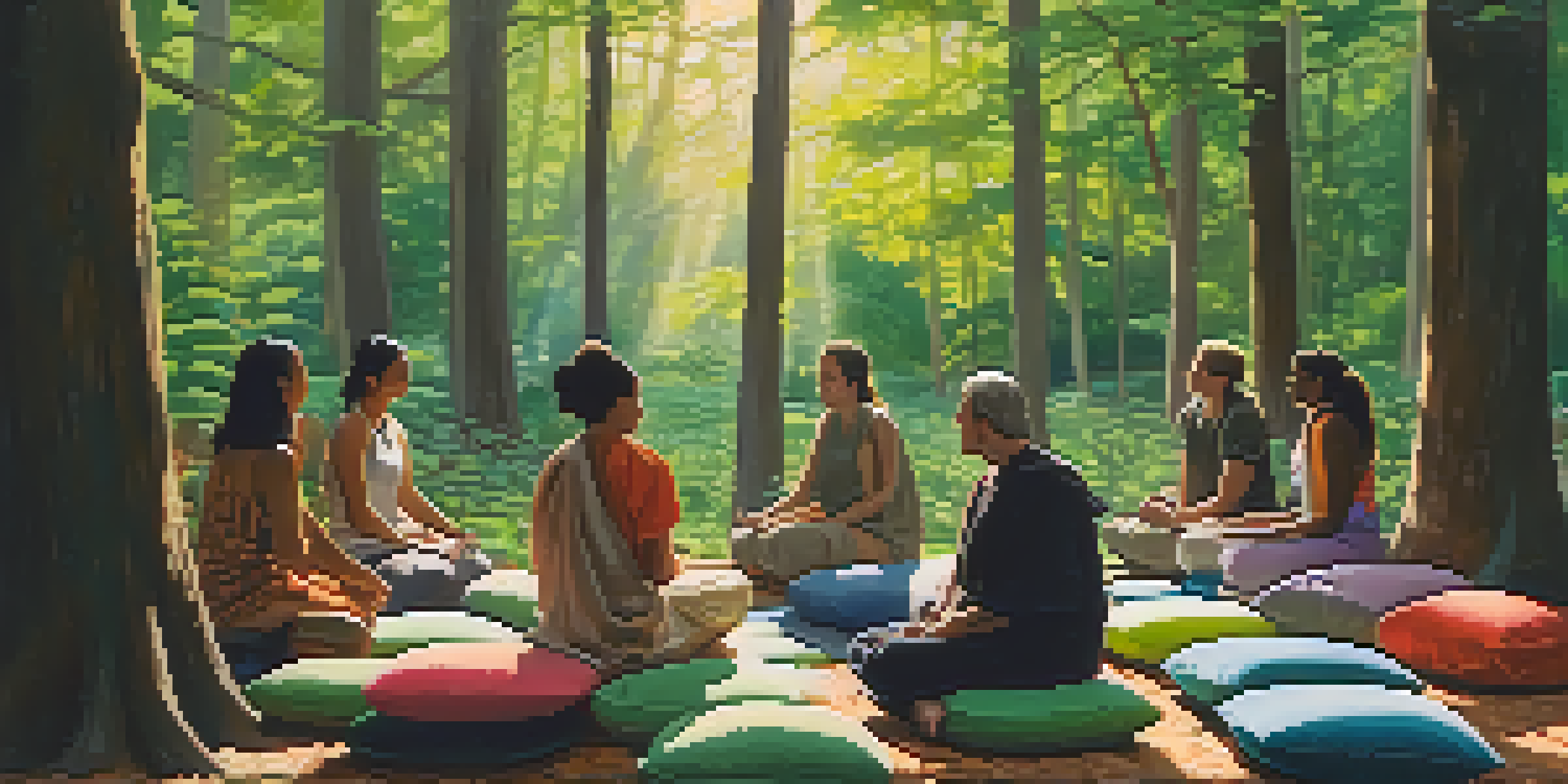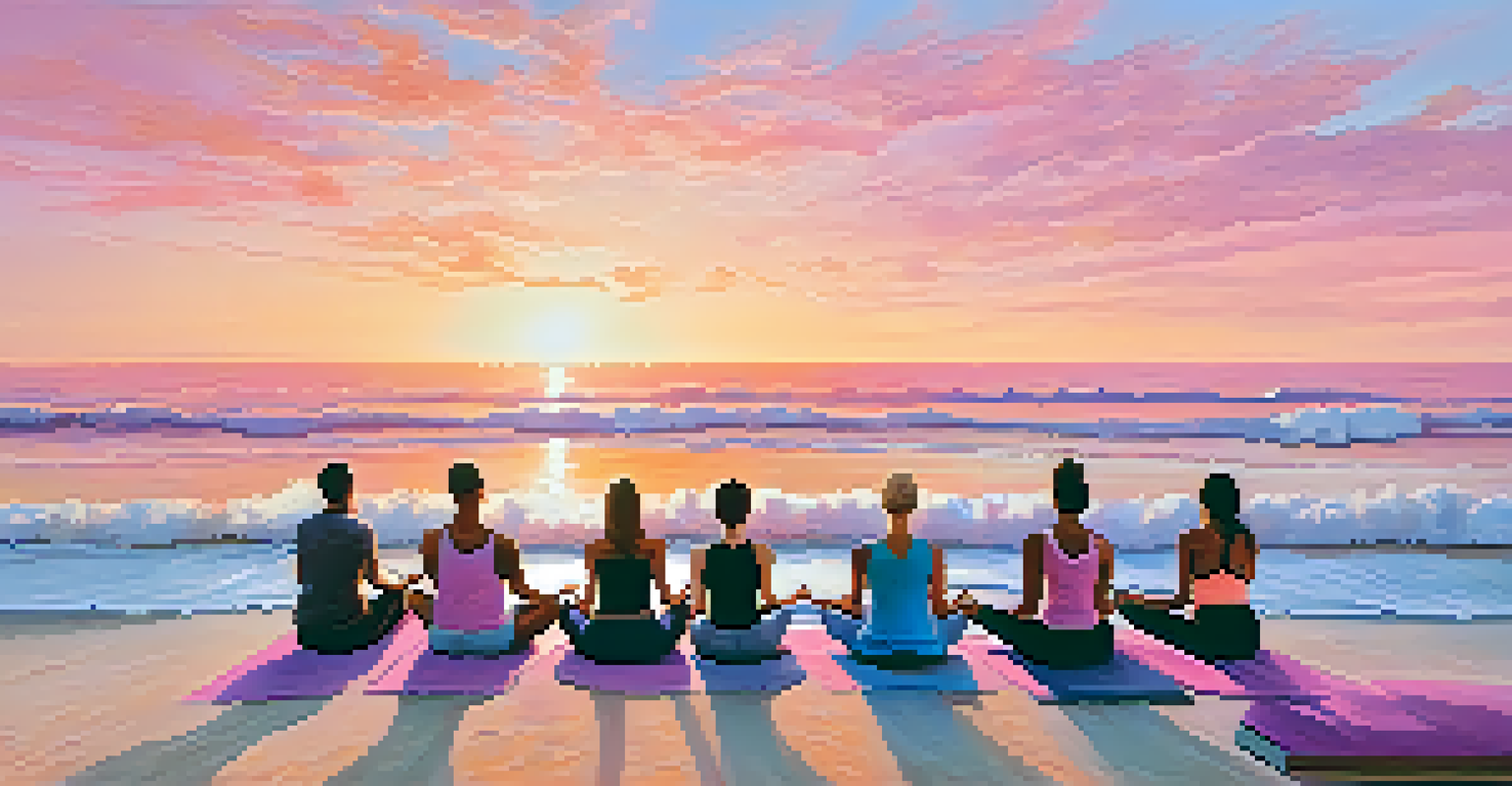Meditation Retreats: Deepening Your Practice Away from Home

Understanding the Essence of Meditation Retreats
Meditation retreats are immersive experiences designed to deepen your practice away from the distractions of daily life. These retreats typically last from a weekend to several weeks, providing a dedicated space for reflection and mindfulness. By stepping away from your routine, you allow yourself to fully engage with the practice, fostering a sense of inner peace.
Meditation is a way to be a part of the world, not apart from it.
Imagine taking a mini-vacation for your mind—just as you would escape to a beach to unwind, a meditation retreat offers a chance to recharge your mental and emotional batteries. Participants often find that the serene environment enhances their ability to focus and connect with their inner selves. It’s like hitting the reset button on your mind, allowing clarity to emerge.
Whether you're a beginner or an experienced meditator, these retreats cater to various skill levels and styles, ensuring everyone can benefit. The guidance from experienced instructors often provides valuable insights and techniques that can be integrated into your daily practice. In essence, meditation retreats are a nurturing space for growth and exploration.
Benefits of Attending a Meditation Retreat
One of the primary benefits of a meditation retreat is the opportunity to disconnect from the hustle and bustle of everyday life. This break allows you to step back and gain perspective on your thoughts and emotions, leading to greater self-awareness. It's almost like cleaning out a cluttered closet; once you clear the space, you can see what you truly need.

Additionally, being surrounded by like-minded individuals creates a sense of community and support. Sharing your experiences and challenges with others can foster connection and deepen your understanding of meditation. Think of it as joining a book club where everyone is on the same journey, providing encouragement and insights along the way.
Meditation Retreats Foster Growth
These immersive experiences allow participants to deepen their practice and gain insights in a supportive environment.
Lastly, meditation retreats often incorporate various practices such as yoga, nature walks, and journaling, enriching your experience. These complementary activities help you explore mindfulness from different angles, making it a holistic journey. The combination of these practices can lead to profound personal transformations that extend far beyond the retreat.
Types of Meditation Retreats Available
Meditation retreats come in many forms, catering to different preferences and needs. Some focus on silent meditation, where participants spend time in stillness, allowing thoughts to settle and clarity to emerge. Others might emphasize guided sessions, where instructors lead you through specific techniques, making it easier for newcomers to engage.
The quieter you become, the more you can hear.
There are also specialized retreats that focus on particular themes, such as mindfulness, compassion, or even specific meditation techniques like Zen or Vipassana. This variety means you can choose a retreat that resonates with your personal goals and interests. Think of it as selecting a class in school; each offers unique lessons and experiences.
Lastly, retreats can vary in duration and setting—from weekend getaways in local nature spots to extended stays in serene, remote locations. This flexibility allows you to find an option that fits your schedule and comfort level. Whether you have just a couple of days or a few weeks, there’s likely a retreat that aligns with your needs.
Preparing for Your First Meditation Retreat
Preparation is key to making the most of your meditation retreat experience. Start by setting clear intentions about what you hope to achieve or explore during your time away. Whether it's finding peace, learning new techniques, or simply disconnecting, having a purpose can enhance your experience significantly.
Next, consider your comfort and needs during the retreat. This includes packing appropriate clothing, personal items, and any meditation tools you may wish to use. Remember, the goal is to create a space where you feel at ease, so think about items that help you relax, like a journal or comfortable cushion.
Nature Enhances Meditation Impact
Being surrounded by natural beauty promotes tranquility and helps individuals connect with their inner selves.
Finally, approach the retreat with an open mind and a willingness to embrace the experience fully. It's perfectly normal to feel a bit anxious about stepping into something new. However, letting go of expectations and remaining present can lead to unexpected insights and growth. Just like a roller coaster, the ride may be thrilling, but the journey is what truly matters.
Common Misconceptions About Meditation Retreats
Many people have misconceptions about meditation retreats, often believing they require advanced skills or complete silence. In reality, retreats are designed for all levels, and most offer guidance to help participants develop their practice, regardless of their background. It’s like being at a cooking class; you don’t need to be a chef to enjoy learning something new.
Another common myth is that retreats are only for those seeking spirituality or enlightenment. While many participants do explore these themes, others simply seek relaxation and stress relief. Everyone's journey is unique, and a retreat can be a personal exploration of self, much like a vacation where you focus on your well-being.
Lastly, some individuals assume that meditation retreats are rigid and unwelcoming. However, most retreats encourage a supportive and open environment, fostering connections among participants. Think of it as joining a friendly gathering where everyone shares a common interest, creating a sense of belonging and warmth.
The Role of Nature in Meditation Retreats
Nature plays a significant role in the effectiveness of meditation retreats, providing a serene backdrop that enhances the experience. Being surrounded by natural beauty can evoke feelings of calm and tranquility, making it easier to focus on your inner self. Just as a flower blooms more vibrantly in sunlight, your mind can flourish in a peaceful environment.
Many retreats are strategically located in scenic areas, whether it’s a forest, mountains, or by the sea. This connection to nature allows participants to engage in outdoor activities like hiking or simply enjoying the surroundings, promoting a holistic approach to well-being. It’s a reminder that just as we nurture our minds, we can also draw energy and inspiration from the world around us.
Integration is Key Post-Retreat
Continuing meditation and reflection after the retreat is essential for maintaining the clarity and insights gained during the experience.
Moreover, nature often serves as a powerful metaphor in meditation practice. The changing seasons, the flow of a river, or the stillness of a forest can mirror our own inner experiences, helping us understand impermanence and acceptance. By immersing ourselves in nature, we can learn valuable lessons about patience, resilience, and peace.
Integrating Retreat Insights into Daily Life
After attending a meditation retreat, the real challenge lies in integrating the insights and practices into your everyday life. Start by setting aside time each day to meditate, even if it’s just for a few minutes. This consistency can help you maintain the calm and clarity you experienced during the retreat, much like watering a plant to keep it healthy.
You might also consider keeping a journal to reflect on your thoughts and experiences post-retreat. Writing can be a powerful tool for processing emotions and reinforcing the lessons learned during your time away. It’s akin to capturing a beautiful sunset; the more you document, the more you appreciate its nuances.

Lastly, seek out community or support groups to continue your journey. Connecting with others who share similar interests can provide motivation and encouragement. Think of it as joining a club where everyone is cheering each other on, helping you stay committed to your practice and personal growth.